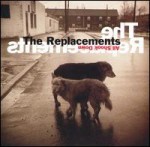Twenty Years Later: The Replacements, 'All Shook Down'

This month marks the twentieth anniversary of All Shook Down, the final album by the Replacements, a band from Minneapolis that I am now finding greater difficulty writing about than I thought I would because of their huge, huge importance to me. Let me puke out something like that, in the mid-80s when I was a teenager and they were at their peak, their fuzzy, blaring rock n’ roll was the sound of truth and freedom and glory as I heard it, and that Paul Westerberg’s lyrics carved what I felt to be a secret message into my soul that told me what it meant to be alive. Okay, there. I feel a little better now. But I’m sorry you had to read that. Anyway, by the time All Shook Down came out, they were not at their peak. They were close to calling it quits and they knew it, it seemed.
Westerberg intended a lot the songs to be solo material, apparently. Session musicians play the parts of band members on many of the tracks. On the whole, it’s not nearly as good as their best work. That said, listening to it now, it sounds better than I would have expected. The playing is lackluster and the production somewhat ill-fitting, but the songs are still more satisfying than most of what you hear from other artists. A few of them, the slower ones mostly-”Merry Go Round,” “Sadly Beautiful,” the title track-measure up to any Westerberg has written. And then there’s the last song, appropriately titled “The Last.” If there was one thing that set Westerberg’s songwriting apart and above that of so many others, it was a sense of self-awareness, a realism about the imperfections he found not only with the world, but with himself-the teenager bragging about things he doesn’t understand in “Sixteen Blue” comes to mind, or the megalomaniacal suicide in “The Ledge,” or, of course, the desperate yearning to be special of “Here Comes a Regular.” That was there to the end, in a quiet little song about getting sober that also served as a goodbye note to Replacements fans, an honest admission that it was over. It’s about as perfect a way to end an album, and a band, as anyone’s ever come up with.
